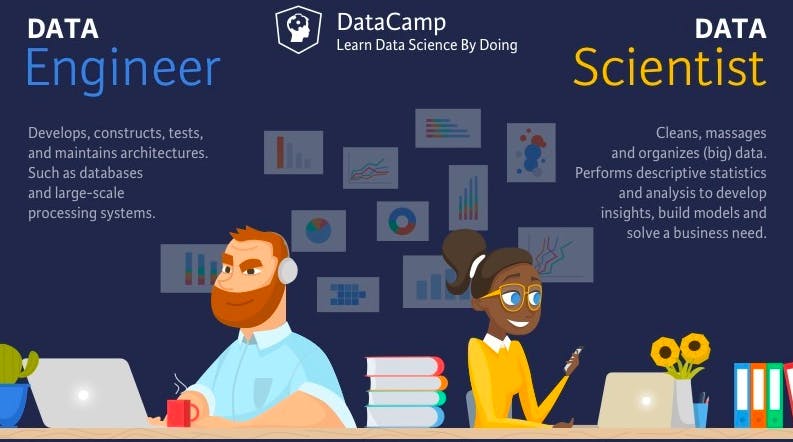Getting Started in Data Engineering
As long as there's data to process, data engineers will be in demand.
What is Data Engineering?
Data engineering is the practice of designing and building systems for collecting, storing, and analyzing data at scale.
Data engineers build systems that collect, manage and convert raw data into usable information for Data Scientists and Business Analysts to interpret.
In other words, Data Engineers make the lives of Data Scientists and Machine Learning Engineers easier.
What Does a Data Engineer Do?
- Acquire datasets that align with business needs
- Develop algorithms that transform the datasets into useful information
- Build, test and, maintain Database pipelines
- In some cases, ensure compliance with data governance and security policies
Data Engineers working in smaller companies or startups typically take up more responsibility as opposed to bigger companies where different Data Engineering teams handle different tasks.
Where did Data Engineering come from?
"Information Engineering" was coined in the late 1980s to describe Database Design + Software Engineering in Data Analysis. In the 1990s and early 2000s, the term "Big Data" was coined.
It was not until 2011 that the term "Data Engineering" cropped up within data-driven companies such as Facebook (now Meta) and Airbnb. With mountains of potentially valuable data, their Software Engineers needed to develop tools to handle all that data quickly and correctly.
What differentiates a Data Scientist from a Data Engineer?
Big Data projects previously failed due a to lack of reliable data infrastructure which meant data could not be trusted enough to base key business decisions on it.
It was apparent that Data Scientists were needed to make sense of the data, but less apparent that someone was needed to organize and ensure the data's quality for the Data Scientists to do their jobs.
Today, most corporate organizations have completed their digital transformation, and with enabling technologies such as the Internet of Things (IoT) it is clear that Data Engineers are required to provide the foundation for successful Data Science Applications.
 Image Credit: DataCamp
Image Credit: DataCamp
- Today, the volume, velocity, and veracity of data have led to the distinction between the roles of Data Scientists and Data Engineers.
- There's a frequent collaboration between Data Engineers and Data Scientists. However, the priority skills and knowledge of tools are different.
- Data Scientists are focused on advanced analysis of data that's generated and stored in a company's databases. Data Engineers design, manage and optimize the flow of data in those databases throughout the organization.
Should you pursue a career in Data Engineering?
As long as there is data to process, data engineers will be in demand.
Being a Data Engineer is both rewarding and challenging as you'll play a role in an organization's success, and provide easier access to data that data scientists, analysts, and decision-makers need to do their jobs. Your Computer programming and problem-solving skills will be applied to create scalable solutions.
Salaries?
- The average salary in the U.S is $115,176 with some Data Engineers earning as much as $168,000 per year, according to Glassdoor (May 2022 findings)
- The average salary for a Junior Data Engineer in Kenya is KES 150,000 - 200,000
As your career in Data Engineering progresses, you may end up in managerial roles or become a Data Architect, Solutions Architect, or Machine Learning Engineer.
How can you become a Data Engineer?
1. Develop Data Engineering Skills
These include:
- Programming languages (Python is the most popular)
- Structured Query Language (SQL)
- Knowledge of Relational and Non-Relational Databases
- Working in Cloud Environments
- etc.
2. Get Certified
Certifications allow potential employers to validate your skills.
3. Build a portfolio of Data Engineering Projects
- Data pipelines
- Batch Processing workflows
- etc.
4. Start with an entry-level position
And just like that, your journey as a Data Engineer has begun!
In the next article, we'll get to explore the different tools and technologies that Data Engineers work with.
